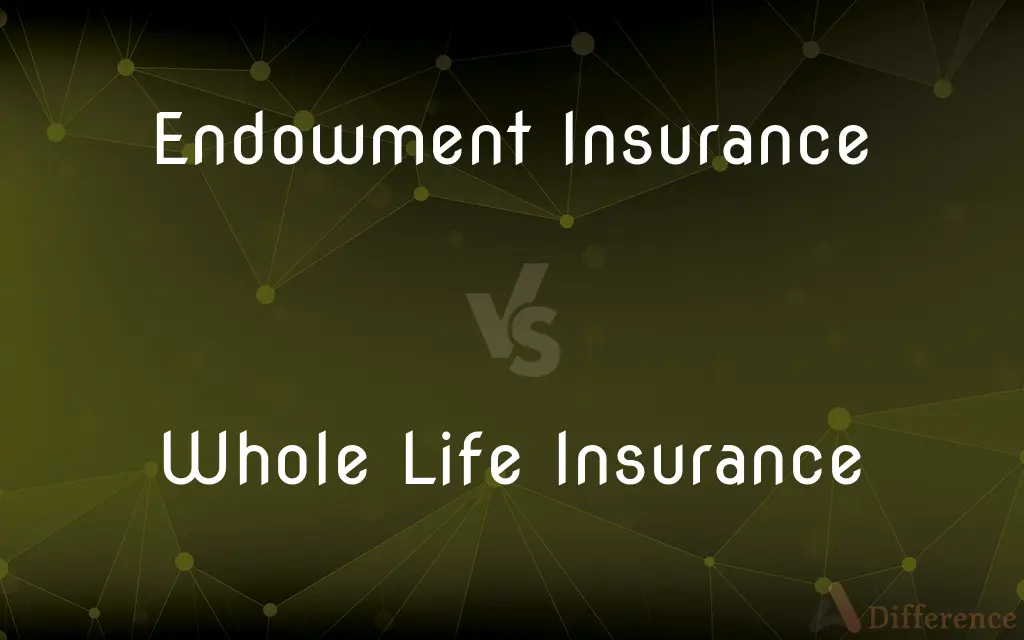Endowment Insurance vs. Whole Life Insurance — What's the Difference?
By Tayyaba Rehman & Fiza Rafique — Published on February 3, 2024
Endowment Insurance provides coverage for a specific period and pays out at policy maturity or death. Whole Life Insurance covers the insured's entire life, paying a death benefit to beneficiaries.

Difference Between Endowment Insurance and Whole Life Insurance
Table of Contents
ADVERTISEMENT
Key Differences
Endowment Insurance is a life insurance policy that not only provides a death benefit but also accumulates a cash value over a fixed period, after which the policy matures and pays out. In contrast, Whole Life Insurance is designed to last for the insured's entire life, with premiums typically remaining level and a guaranteed death benefit, along with a cash value component that grows at a guaranteed rate.
While Endowment Insurance policies are often used for specific financial goals, such as funding education or retirement at a certain age, Whole Life Insurance is primarily focused on providing lifelong financial security and estate planning. Endowment policies tend to have higher premiums than Whole Life policies due to the shorter accumulation period and the certainty of the payout at maturity.
The cash value component of Endowment Insurance typically grows at a fixed rate and becomes payable at the policy's maturity or the policyholder's death, whichever comes first. On the other hand, the cash value in Whole Life Insurance grows tax-deferred and can be borrowed against or withdrawn by the policyholder during their lifetime, with the death benefit reduced accordingly.
Endowment Insurance is often purchased for its investment component, with the policyholder expecting a return at the end of the term. Conversely, Whole Life Insurance is seen as a long-term financial tool for wealth transfer, with its cash value and death benefit providing financial stability and support to beneficiaries.
From a flexibility standpoint, Endowment Insurance tends to be less flexible once issued, with its terms, premium, and payout set at the outset. Whole Life Insurance, while requiring consistent premium payments, offers more options in terms of policy loans, dividend payments, and adjustments to the death benefit and premium payments over the life of the policy.
ADVERTISEMENT
Comparison Chart
Duration
Fixed term; matures at a certain age or date
Lifetime coverage
Premiums
Higher due to shorter term
Lower but over a lifetime
Death Benefit
Paid at death or policy maturity
Paid at death only
Cash Value Accumulation
Fixed rate, paid out at maturity or death
Grows tax-deferred, accessible during life
Main Purpose
Investment for a specific goal; financial planning
Long-term financial security; estate planning
Compare with Definitions
Endowment Insurance
Endowment Insurance is taken for a fixed duration, offering a lump sum at the end of the term.
The couple's Endowment Insurance policy was a financial safeguard for their child's future.
Whole Life Insurance
Whole Life Insurance offers a financial safety net that lasts the insured's entire life.
His Whole Life Insurance was a cornerstone of his long-term financial strategy.
Endowment Insurance
Endowment Insurance promises a sum assured either at death or policy maturity.
The Endowment Insurance policy matured, easing her transition into retirement.
Whole Life Insurance
Whole Life Insurance is often used for wealth transfer and estate planning.
The family used Whole Life Insurance to preserve and pass on their wealth.
Endowment Insurance
Endowment Insurance serves as both a life insurance policy and an investment plan.
Their Endowment Insurance provided the dual benefit of financial protection and investment growth.
Whole Life Insurance
Whole Life Insurance premiums remain constant, providing predictable financial planning.
Their consistent investment in Whole Life Insurance secured their financial future.
Endowment Insurance
Endowment Insurance combines life coverage with savings, accumulating value over a specific term.
Her Endowment Insurance matured, providing funds for her daughter's college education.
Whole Life Insurance
Whole Life Insurance builds cash value over time, offering a living benefit to the policyholder.
She borrowed against her Whole Life Insurance's cash value for her home renovation.
Endowment Insurance
Endowment Insurance covers you for a period, offering a maturity amount if you outlive the term.
He chose Endowment Insurance to ensure a payout for his retirement.
Whole Life Insurance
Whole Life Insurance offers lifelong protection with a guaranteed death benefit.
His Whole Life Insurance ensured his family's financial stability after his passing.
Common Curiosities
Is Endowment Insurance a good investment?
It can be, especially if you value the combination of savings discipline, life cover, and a guaranteed payout.
What is Endowment Insurance?
Endowment insurance is a life insurance policy that pays a lump sum after a specific term or upon the policyholder's death.
Can I borrow against my Endowment Insurance?
Some policies allow loans against the cash value, but terms vary by policy and insurer.
What happens if I outlive my Endowment Insurance policy?
You’ll receive the policy amount at the end of the term.
Are Endowment Insurance payouts taxable?
Generally, payouts are tax-free, but consult a tax advisor for your specific situation.
Are Whole Life Insurance payouts taxable?
Death benefits are usually tax-free, but loans and withdrawals can be taxable.
Can I borrow against my Whole Life Insurance?
Yes, policyholders can borrow against the cash value, but this may reduce the death benefit.
How does Endowment Insurance work?
Policyholders pay regular premiums. The policy pays out the face value either at the end of the term or upon the insured's death.
How does Whole Life Insurance work?
Policyholders pay fixed premiums, and the policy includes a death benefit and a savings component that grows over time.
What are the benefits of Endowment Insurance?
Benefits include a savings component, life coverage, and a fixed-term return on investment.
What is Whole Life Insurance?
Whole Life Insurance is a type of permanent life insurance that provides coverage for the policyholder's entire life.
What happens to the cash value in Whole Life Insurance at death?
Typically, the cash value is absorbed by the insurer, and the beneficiaries receive the death benefit.
Is Whole Life Insurance more expensive than Term Life Insurance?
Yes, generally, because it provides lifetime coverage and has a savings component.
What are the benefits of Whole Life Insurance?
Benefits include lifelong coverage, cash value accumulation, and potential dividends.
Share Your Discovery

Previous Comparison
Worker vs. Employee
Next Comparison
Soya Chunks vs. Soya GranulesAuthor Spotlight
Written by
Tayyaba RehmanTayyaba Rehman is a distinguished writer, currently serving as a primary contributor to askdifference.com. As a researcher in semantics and etymology, Tayyaba's passion for the complexity of languages and their distinctions has found a perfect home on the platform. Tayyaba delves into the intricacies of language, distinguishing between commonly confused words and phrases, thereby providing clarity for readers worldwide.
Co-written by
Fiza RafiqueFiza Rafique is a skilled content writer at AskDifference.com, where she meticulously refines and enhances written pieces. Drawing from her vast editorial expertise, Fiza ensures clarity, accuracy, and precision in every article. Passionate about language, she continually seeks to elevate the quality of content for readers worldwide.














































